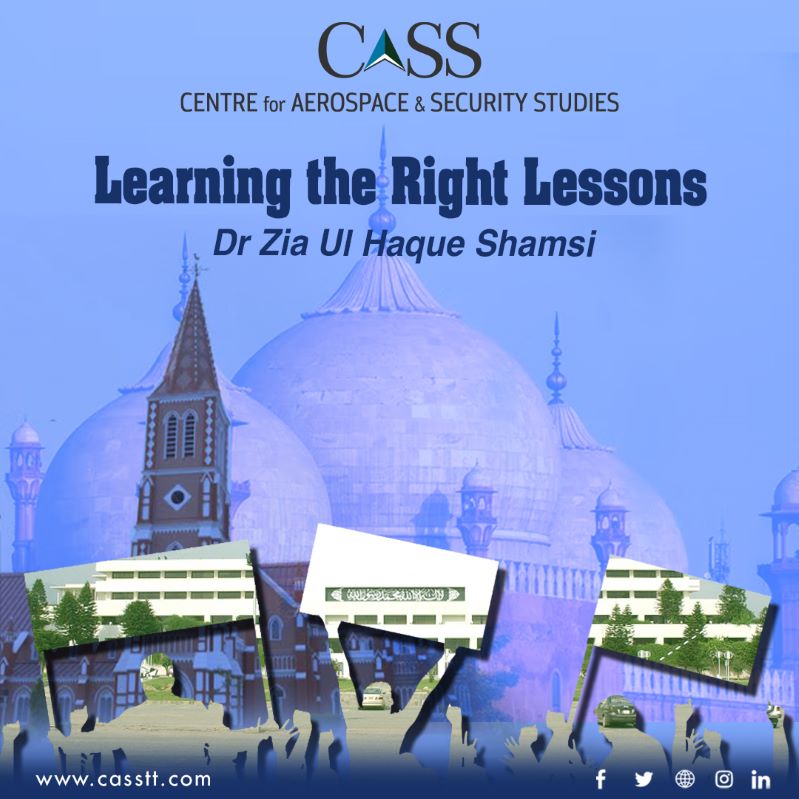It is often argued that religion must be kept out of politics and state administration, perhaps because people do exploit religious sentiments for personal gains and create a wedge in society. If this is the reason, then the proponents of keeping religion out of politics and state have a sound argument.
However, I look at religion from a different perspective. The state and politics can learn a lot from religious teachings in fair administration and dispensation of justice for the well-being of people.
This article is aimed at highlighting the significance of religious teachings and historical illustrations for learning the right lessons and correcting the course of any state that is being affected by polarisation and is plagued with societal ills. In fact, religion, as defined is ‘human beings’ relation to that which they regard as holy, sacred, absolute, spiritual, divine, or worthy of especial reverence. It is also commonly regarded as consisting of the way people deal with ultimate concerns about their lives and their fate after death.’ Therefore, societal matters can best be addressed through religious teachings, without seeing the latter as interfering with state affairs.
I have written this earlier also that the Holy Quran encompasses in its contents the doctrinal elements, policy ingredients, strategic thinking, as well as tactical considerations on various aspects of life: personal, family, society, state, and the universe. Therefore, learning from Quranic teachings to address societal ills cannot be seen as dragging religion into politics and state affairs. Likewise, learning from Sunnah, as practiced by the Holy Prophet (Peace Be Upon Him), would also be extremely helpful because of his exemplary leadership qualities and his experience of moulding the Arab society of the time. Moreover, the Prophet (Peace Be Upon Him) followed the Quranic teachings in letter and spirit, and Sunnah is a reflection of Quran, only.
Next in line are the historical examples of moulding society and running state affairs in an orderly manner. Be it from Islamic history or Western history, they serve as a resource on the subject. These historical examples of governing a state may not necessarily reflect religious leanings but certainly carry the shades of religious teachings. Nearly all major United Nations’ Treaties are reflective of human values that carry the basic teachings of Abrahamic or all other religions. For instance, peace is fundamental to well-being of people and no society can progress without ‘peace within and peace without.’
Likewise, the Rights for all living being, including animals, are enshrined in all the worldly documents but are inspired by religious fundamentals. The basic rights of every human being for bread, clothing, and shelter are protected by all religions. Hinduism may have some differences with regard to equality among different sects, but no other religion preaches or practices that aspect.
The next source of drawing lessons for state governance are perhaps the contemporary models that have existed for decades now. These models are inspired by theories proffered by social scientists and are practiced by most developed nations and a number of developing states as well. However, the purpose of each of these theories and models is to manage state affairs in an orderly manner and the well-being of citizens. Wherever this particular aspect was ignored, either by practicing a certain philosophy or by an authoritarian regime, the people suffered and the state either remained isolated or backward.
At the cost of repetition, I support the argument that the role of religion in the affairs of the state for the benefit of society must not be ignored for the sake of following a dictum that religion should have no role in state governance. There is no denying that religion must not be used as a tool to motivate people in a particular extremist direction that is at variance with a state’s policy and strategy to manage its affairs in an orderly manner. However, the fundamentals of each religion serve as a huge resource of lessons for managing society, if the right lessons are drawn and implemented with sincerity of purpose and justice.
Dr Zia Ul Haque Shamsi is the author of ‘Nuclear Deterrence and Conflict Management Between India and Pakistan’ and ‘South Asia Needs Hybrid Peace.’ He is presently working as Director (Peace and Conflict Studies) at the Centre for Aerospace & Security Studies (CASS), Islamabad, Pakistan. The article was first published in Daily Times. He can be contacted at: [email protected].





